
When Sanchirmaa Altankhuyag and I first met during the WISE Learners’ Voice Program in 2014, little did we know that four years later we would be driving across Mongolia in a Land Cruiser, on a mission to teach students about climate change.
In the intervening years, Sanchirmaa taught in schools in Ulaanbaatar and started a PhD in Education at the Moscow State Pedagogical University. I graduated with a biology degree from Harvard, and worked for numerous environmental conservation organizations around the world. We reconnected with an interest in innovative approaches to environmental education. I rallied a few more friends with a similar passion, and together we started the nonprofit, Climate Caravan, to help younger generations acquire a comprehensive understanding of environmental challenges.
This summer, through the support of a National Geographic Society grant and Microsoft, we drove more than 2,300 miles and taught more than 750 students across Sanchirmaa’s home country of Mongolia, one of the countries facing the highest rates of desertification in the world. We released the bilingual (English and Mongolian) original storybook, “The Adventures of Tuya and Noyon” which follows a young Mongolian girl, Tuya, and her snow leopard friend, Noyon, as they set off on a journey to find their family’s missing herd. The choose-your-own-adventure book engages students and its adventure plot helps young students break down and better understand complex phenomena such as climate change and its far-reaching consequences. We also designed an accompanying ethnographic and scientific curriculum to allow students to dive deeper into the principles introduced in the story (such as overgrazing, desertification, human-wildlife conflict, and the greenhouse effect). The interactive and inquiry-based curriculum requires students to form and test their own hypotheses to help Tuya and Noyon on their journey.
It was exciting to see the action students took in their personal lives after reading about how Tuya asked her elders for their perspectives on the changes during their lives. The students shared with pride the recordings of interviews they had with their own family members about their life experiences. We clasped hands, shrieked, and ran on the playground as we playacted the roles of snow leopards hunting ibexes. When we graphed the predator and prey population sizes from the different rounds of the games, we could see the “aha!” moment light in their eyes when they realized how predator and prey population sizes fluctuated in tandem. These moments in the classroom were emphasized by the words of positive encouragement we received from teachers and school coordinators alike, who stressed the timeliness and necessity of environmental education. We also trained student teachers and the education officers of nonprofit organizations, so that schools and organizations including the Snow Leopard Trust, World Wildlife Fund, and the Wildlife Conservation Society can continue to use Climate Caravan’s curriculum in Mongolia.
As the caravan drove across Mongolia, the travel on the ground gave us deeper insight into Mongolia’s connected and changing landscape. I witnessed firsthand the burgeoning herd sizes on vast swaths of desertified land in the steppes, where nomadic families were still trying to eke out a living. The families we talked to all voiced the same concern about the increasing difficulty of their daily lives. In the absence of systematic efforts to stabilize their areas and ensure the resiliency of livelihoods, many would ultimately have no choice but to abandon their traditional way of life for a feasible life in nearby towns and cities. Seeing this harsh reality in-person only reinforced the necessity and promise of providing engaging and relevant environmental education, the aim of Climate Caravan.
When we first chose the word “caravan” for our name, it evoked visions of communal travels and the survival of people on long journeys in yesteryear. Now, our view of a caravan should be larger. All of humanity living on planet Earth is on a caravan together. We need to understand each other, think of each other, and work together if we are to survive this journey. We at Climate Caravan are excited to do our part to help.


